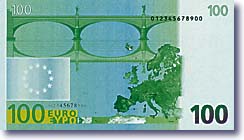The Euro Debate 



Sir Alan Walters predicts the euro will collapse
|
Alan Walters warned Margaret Thatcher that entering the ERM would be a disaster and predicted that the ERM itself was heading for a crisis. He now says that the euro will collapse within five years.
Walters was Thatcher�s personal economic adviser when she was prime minister. In May 2002 he said that the euro would collapse under its own internal contradictions and strains. �We�re already seeing real problems for the euro,� he said. �I don�t know precisely how it will break up, but I know it will break up.� Walters explained that euro-member countries had different growth and inflation rates, persistent high unemployment and some had severe budget deficits which would cause the instability which would lead to the collapse of the euro. �People who think it will go on forever should think again,� he said. �Nothing lasts forever in monetary economics.� Although the accepted wisom is that the euro is permanent, particularly since the conversion from national currencies to euro notes and coins at the start of the year, the history of monetary unions suggests a high failure rate. Any country leaving the euro would have to reissue its former currency and face significant economic dislocation. Walters maintains that the only way that monetary unions can work is if they are preceded by political union. In the early 1980s he helped to persuade Thatcher to push through the tough 1981 budget, which turned conventional wisdom on its head by raising taxes sharply despite the fact that the economy was in a deep recession. Many in the Treasury objected, as did 364 British economists who signed a celebrated letter predicting that the budget would condemn the economy to a prolonged depression. The 364 economists were discredited when the budget led the way to the long economic upturn of the 1980s. Walters�s critics had missed the reason to raise taxes - to allow interest rates to be cut sharply. Interest rates are a key driver of UK economic performance because of the huge amount of debt - including mortgage borrowings for houses - dependent on short-term interest rates. In the late 1980s, Walters, who described the ERM as �half baked�, advised Thatcher to resist pressure from Nigel Lawson, the finance minister, and Sir Geoffrey Howe, the foreign minister, to take Britain in. In 1989, Lawson insisted that Thatcher sack Walters. She refused, he resigned, and Walters went too. A film about Sir Alan called Sir Alan Walters: An Intellectual Portrait reveals the extent of Walters�s predictive skills. In 1971-72, as an adviser to Sir Edward Heath, he told the then prime minister that within a couple of years he would be faced with 15% inflation, a record current-account deficit and the return of prices-and-incomes policies. Heath told him he was talking nonsense and that none of his other advisers were predicting anything of the sort, suggesting that he should leave. All three predictions were correct and the resulting chaos brought down the Heath government. In 1990 Walters predicted that the ERM, which Britain was on the point of joining, was heading for a crisis. Two years later, in September 1992, there was Black Wednesday and the near-collapse of the ERM. As in 1981, Walters is in a minority as few economists believe Europe�s monetary union will collapse outright. But many believe that strains could develop if the left wing governments of the past are replaced by governments of the right and after new and weaker economies are added to the group of countries in the euro. |